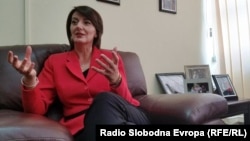Ex-Kosovo president can't enter Serbia
| Publisher | Radio Free Europe/Radio Liberty |
| Publication Date | 2 June 2017 |
| Cite as | Radio Free Europe/Radio Liberty, Ex-Kosovo president can't enter Serbia, 2 June 2017, available at: https://www.refworld.org/docid/59818dbaa.html [accessed 21 May 2023] |
| Disclaimer | This is not a UNHCR publication. UNHCR is not responsible for, nor does it necessarily endorse, its content. Any views expressed are solely those of the author or publisher and do not necessarily reflect those of UNHCR, the United Nations or its Member States. |
June 02, 2017 11:57 GMT
By RFE/RL's Balkan Service
 Atifete Jahjaga, a Kosovar politician who served as the fourth president of Kosovo, speaks in Pristina on June 2.
Atifete Jahjaga, a Kosovar politician who served as the fourth president of Kosovo, speaks in Pristina on June 2.
A former Kosovo president had to turn back from the border with Serbia, where she was to participate in an event meant to promote dialogue between the former war enemies.
Atifete Jahjaga was to attend a presentation on June 2 in Belgrade, the Serbian capital, of a book containing testimonies from women tortured and raped during the 1998-99 Kosovo war.
Meanwhile, police prevented several dozen people shouting nationalist slogans from entering the venue of the festival, a four-day event organized by civil rights groups.
Kosovo declared independence from Serbia in 2008 and is recognized by 114 countries but not by Belgrade.
According to protocol, Serbian police were supposed to provide Jahjaga with a security detail upon entrance into Serbia, but no police escort showed up at the border crossing on June 1.
Jahjaga had to eventually return. Serbian police haven't immediately offered an explanation for failing to provide an escort for her.
She planned to address the gathering via video link instead, the Youth Initiative for Human Rights group said.
Serbia and Kosovo have agreed to participate in European Union-brokered talks as part of efforts to join the bloc, but tensions have persisted amid a surge in nationalism in the volatile Balkans.
With reporting by AP
Link to original story on RFE/RL website
